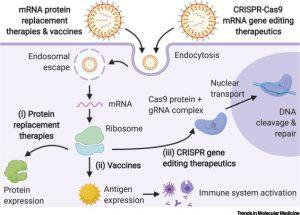As tumours age, they begin to harden on the outside of their cell surface forming a hardened barrier, making it difficult for targeted drugs to penetrate the cell surface and enter into cells for cancer treatment purposes. In a recent paper, Zhang, et al, have developed small particles, nanoparticles, that can break down the barriers around tumours, reaching cancerous cells, providing a potentially improved and effective treatment for cancers. The nanoparticles carry a gene editing system (CRISPR-Cas9) that alters tumour DNA, inhibiting or blocking growth and activating the immune system for targeted attack of the tumour. (Figure 1 for summary) In this paper they looked at this system in ovarian and liver cancers in mouse models.
As the power of CRISPR-Cas9 technology has grown over recent years, delivering this system into solid tumours for DNA editing is still a difficult task (READ MORE). Lipid nanoparticles (LNPs) are small spheres of fatty molecules which can carry molecular cargo into the human body, may offer an attractive option for delivering this system into cancer cells.
In this present study, the researchers made an addition of siRNA to block focal adhesion kinase (FAK), a gene crucial for protection of many tumour types. CRISPR-Cas9 machinery was encapsulated inside of the nanoparticles, targeting the gene PD-L1. This gene inhibits/blocks the immune response towards tumours. By targeting this gene, it may alleviate this blockage and allow the immune system to successfully attack these tumours.
In their own words:
“Overall, we provide evidence that modulating the stiffness of tumour tissue can enhance gene editing in tumours, which offers a new strategy for synergistic LNPs and other nanoparticle systems to treat cancer using gene editing”
Following the positive results of this study, more work is needed to investigate the efficacy and safety of these nanoparticles.
Journal article: Zhang, D, et al., 2022. Enhancing CRISPR/Cas gene editing through modulating cellular mechanical properties for cancer therapy. Nature Nanotechnology.
Summary by Stefan Botha











